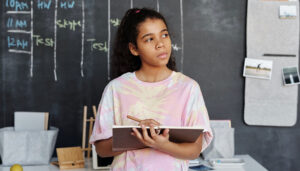An Alternative to Punitive Discipline That Really Holds Students Accountable
Read original Edutopia article here. “Mike” is misbehaving in class. The teacher does not want the flow of the lesson derailed. The teacher calls the main office to remove Mike from the room. Assistant Principal “Lee” arrives, determined that Mike be held accountable for the misbehavior, and assigns Mike to an in-school suspension for the […]





